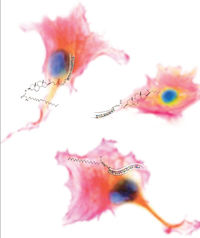ProtAffin AG announces preclinical data in COPD for lead product PA401
Advertisement
ProtAffin AG presents compelling preclinical data in chronic obstructive pulmonary disease (COPD) for its lead product PA401 at the European Respiratory Society Congress in Barcelona, Spain. The Company presents efficacy data for PA401, a glycan-binding decoy protein based on human chemokine IL-8 (CXCL8) in gold-standard preclinical models of COPD. The activity of PA401 was benchmarked against other relevant treatment modalities including the PDE4 inhibitor roflumilast and the CXCR2 antagonist SCH527123. PA401 showed strong and broad anti-inflammatory activity in preclinical models, while also reducing levels of several key inflammatory biomarkers. The differentiated pharmacology of PA401 compared to other treatment modalities suggests that this novel first-in-class product may bring specific benefits to certain populations of COPD patients.
PA401 is the first of a novel class of biopharmaceutical products which are glycan-binding decoy proteins. Specific cell surface glycans underlie inflammatory processes in several diseases including COPD, and represent a rich and relatively under-investigated class of potential drug targets for pharmaceutical and biotechnology companies. ProtAffin’s approach is highly innovative and opens up glycans as druggable targets through the use of its CellJammer® discovery technology. As IL-8 is known to play a central role in the chronic neutrophilic inflammation seen in the lungs of COPD patients, the glycan-binding decoy protein PA401 represents a potential breakthrough in tackling the severe unmet medical need in many patients with COPD.
Dr. Jason Slingsby, CEO of ProtAffin commented: “We are delighted to announce strong, differentiated preclinical efficacy data for our lead product PA401 in preclinical models relevant to COPD. The European Respiratory Society Congress is one of the top gatherings of the respiratory community worldwide and presenting compelling new biology at this conference marks an important step for us as a Company. We look forward to progressing PA401 through preclinical development in 2010 and 2011 and to starting Phase 1 trials early in 2012. Given the unique properties of PA401 in preclinical models of COPD, PA401 may represent a new treatment paradigm for patients with COPD.”
Other news from the department research and development

Get the life science industry in your inbox
By submitting this form you agree that LUMITOS AG will send you the newsletter(s) selected above by email. Your data will not be passed on to third parties. Your data will be stored and processed in accordance with our data protection regulations. LUMITOS may contact you by email for the purpose of advertising or market and opinion surveys. You can revoke your consent at any time without giving reasons to LUMITOS AG, Ernst-Augustin-Str. 2, 12489 Berlin, Germany or by e-mail at revoke@lumitos.com with effect for the future. In addition, each email contains a link to unsubscribe from the corresponding newsletter.


























































